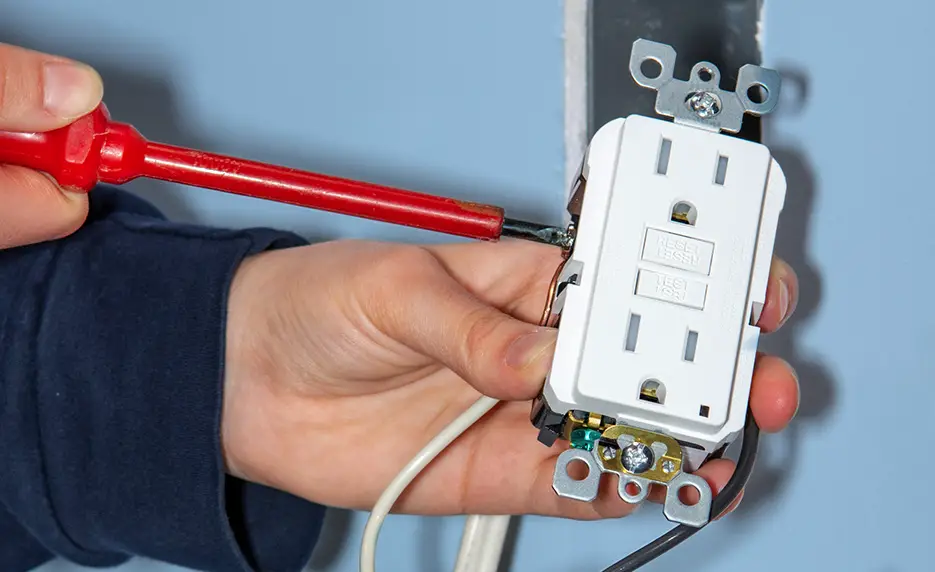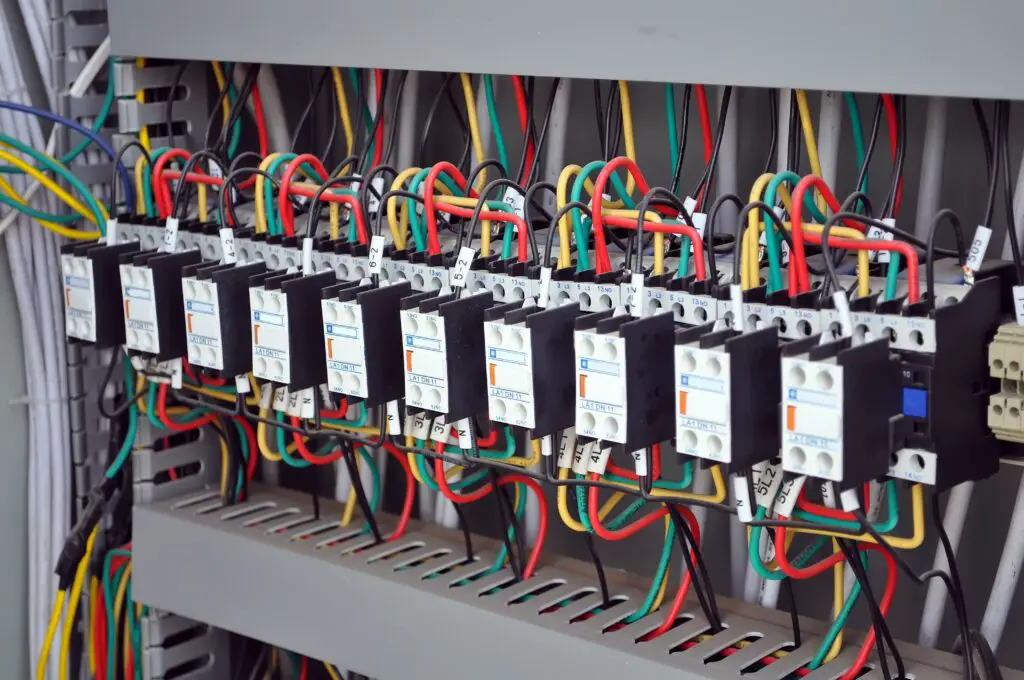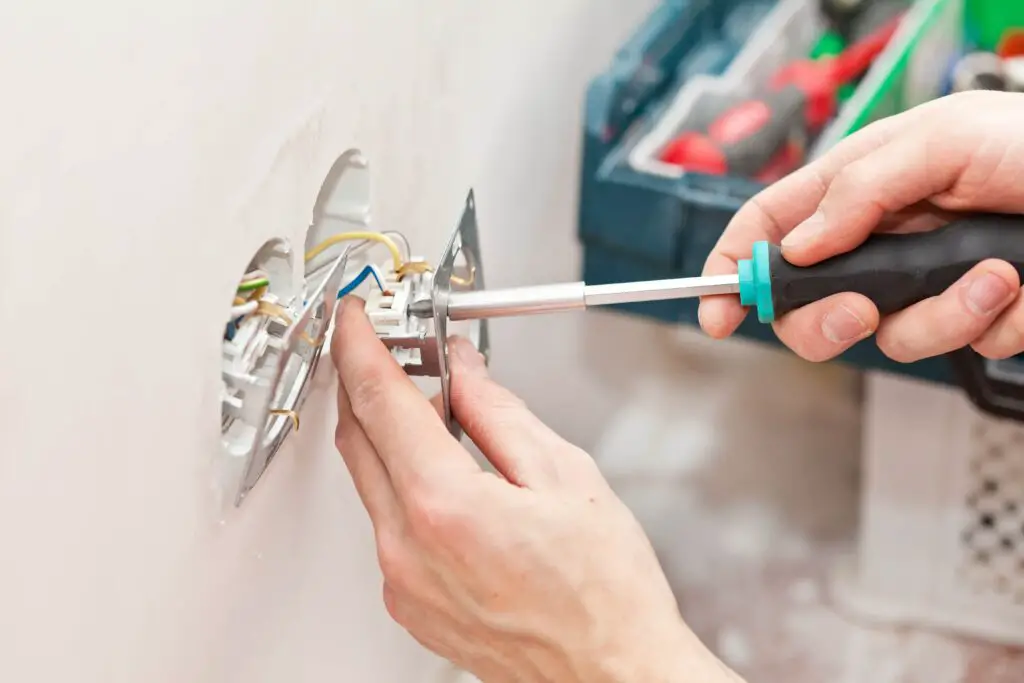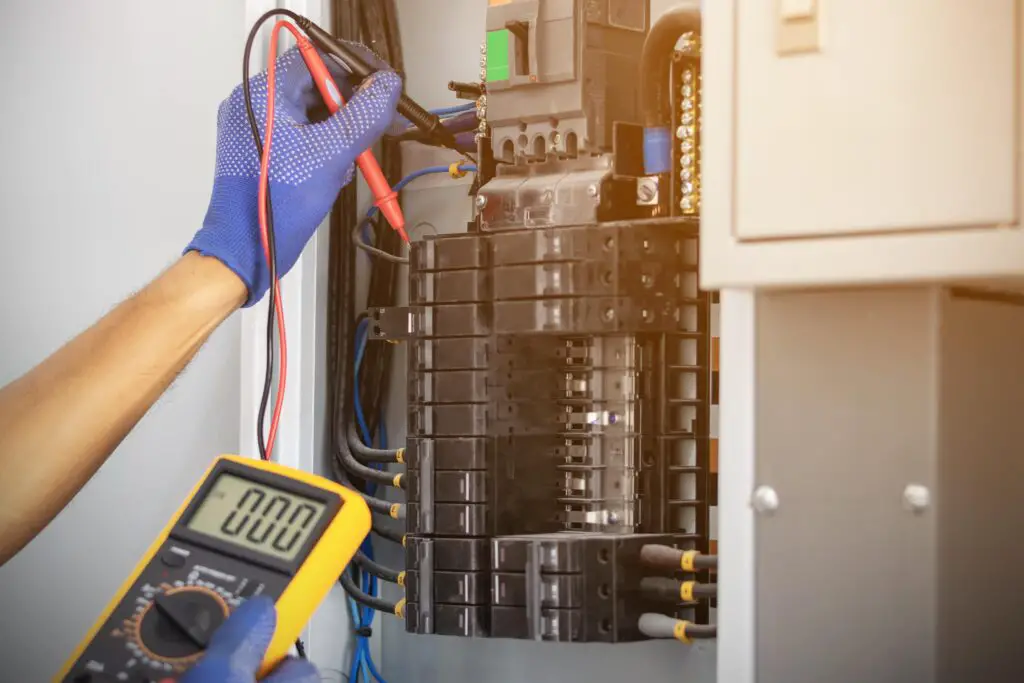Have you ever wondered what the professionals known as residential electricians do? If so, then this blog post is for you! A residential electrician is a skilled tradesperson responsible for installing, maintaining, and repairing electrical systems in homes or other small dwellings. In order to do this essential job effectively and safely, they must be knowledgeable of all relevant codes and regulations while possessing the necessary technical skills. Not only will we answer the question – what is a residential electrician? – but we’ll go into detail about their roles, responsibilities, qualifications, salaries and more. Keep reading to find out why these highly-trained technicians are essential fixtures of home construction projects right here in our communities!
Understanding the Job: What Is a Residential Electrician?

Residential electricians are responsible for wiring homes for power distribution as well as ensuring that circuits are properly installed and functioning correctly. They must also be skilled in reading blueprints to ensure that the correct materials and wiring techniques are used for each project. In addition to their technical expertise, a residential electrician must also have good communication skills in order to discuss their findings with clients effectively.
Residential electricians may specialize in specific areas such as solar energy or security system installations.
Depending on the type of project they may need to acquire additional certifications or licenses. For example, a certified solar installer must pass an exam related to their specific expertise.
In addition to installation and repair work, residential electricians also often provide emergency services for home owners who experience power outages or other electrical issues. In these cases, the electrician will assess the situation and determine what action is necessary in order to restore power as quickly as possible. It is important for homeowners to have a qualified residential electrician on standby in case of any sudden electrical difficulties.
The job of a residential electrician can be both challenging and rewarding, but requires extensive knowledge and skill to succeed in this profession. With proper training and certification, one can become an expert in residential electrical systems and provide quality service to their customers. [1]
Skills Needed
A residential electrician is a skilled tradesman that has the expertise to install, maintain and repair electrical systems in residential buildings. An aspiring residential electrician must have an extensive knowledge of electrical components, tools, and safety standards. In addition to technical abilities, successful residential electricians also possess problem-solving skills, patience for meticulous work, and great physical stamina.
To become certified as a licensed residential electrician requires completing an apprenticeship program and passing an exam administered by the state or local licensing agency.
Once certified, these professionals are capable of safely working on projects in people’s homes such as wiring for new appliances or outlets; installing ceiling fans or lights; replacing circuit breakers; troubleshooting faulty wiring; and conducting regular maintenance on existing systems.
Residential electricians must pay attention to even the smallest of details and have a thorough understanding of electrical codes, regulations, and safety protocols. It is also vital that they keep up with advances in technology to ensure their skills are current. Furthermore, residential electricians are expected to be courteous and reliable when working in clients’ homes, as they are often called upon for emergency repairs or unexpected projects. Professionalism and customer service should be at the forefront of any residential electrician’s job.

Qualifications and Certifications Needed to Become a Residential Electrician
In order to become a residential electrician, you must meet certain qualifications and certifications. In most states, all electricians are required to be licensed in their respective fields. Licensing requirements typically include passing an exam that covers electrical safety topics as well as having documented experience with electrical systems in the home.
Additionally, some employers may require workers to have completed a specific number of hours of apprenticeship or training from an accredited trade school or college program. It is also important for potential residential electricians to have knowledge relating to local building codes and regulations so that they can install and repair wiring systems according to legal standards.
Furthermore, since electrical work involves working with dangerous electricity currents, most states require workers who do this type of job to possess insurance and bonding as a way to protect the customer in case of any accidents. Finally, residential electricians should possess and maintain certain tools for their job, including wire cutters, pliers, and screwdrivers. [2]
In conclusion, becoming a residential electrician requires meeting multiple qualifications and certifications that are necessary for safely installing and working with electrical systems in homes.

Typical Duties of a Residential Electrician
Residential electricians are responsible for the installation, maintenance and repair of electrical systems in homes. They work closely with homeowners to ensure that all electrical components, such as circuits, wiring, outlets, switches and fixtures, comply with local building codes and safety regulations. Common tasks performed by residential electricians include but are not limited to:
- Installing new electrical systems in newly constructed homes or remodeling existing ones.
- Troubleshooting faulty wiring or other issues that can cause power outages or surges.
- Inspecting existing electrical systems for defects or potential hazards.
- Replacing worn out components like light switches, outlets or circuit breakers.
- Testing for proper grounding of the system and installing surge protectors.
- Installing electrical systems for appliances like dishwashers, dryers and hot tubs.
- Upgrading or adding new outlets to accommodate home electronics such as televisions, computers and stereos.
- Working with contractors and other professionals when larger projects are needed.
- Assisting in the estimation of materials and labor costs for a project.
- Keeping records of all electrical work performed on a property.
Residential electricians must stay up to date on changing technologies and safety regulations in order to provide the best service possible to their clients. They should also have excellent problem solving skills in order to diagnose complicated issues quickly and efficiently. With proper training, residential electricians are able to provide a wide range of services for both new and existing homes. Their expertise helps ensure the safety of individuals and families in their own homes.
Average Salary for Electrical Technicians
The salary of an electrician varies depending on their experience, geographic region, and the type of business they work for. According to the Bureau of Labor Statistics (BLS), the average annual wage for electrical technicians in May 2019 was $57,190. The top 10 percent earned more than $90,910 while the lowest 10 percent earned less than $30,570. Salary can also be affected by training received and certifications held. Electricians with specialized skills or additional certification may have higher earning potential compared to general electricians who only have basic skills. [3]
Additionally, there are several other factors that can affect a residential electrician’s salary such as overtime pay, company benefits packages, and bonuses. Some residential electricians may even be eligible for bonus pay when they complete projects under a certain amount of time or stay within their budget. The employee’s experience level, amount of work and location can all influence their salary as well.
Overall, the salary of an electrical technician depends on a variety of factors and can vary significantly from one job to another. While it may be possible to earn a higher salary with additional training and certifications, it is important to note that electricians must comply with safety regulations and codes in order to protect themselves and their clients. Those who are considering becoming residential electricians should research the field thoroughly before making any decisions.

Differentiating Between Commercial and Residential Electrical Work
A residential electrician specializes in the installation, repair and maintenance of electrical systems, components, and wiring for residential buildings. They handle a variety of tasks related to providing power to homes including the installation of outlets and switches, running new circuits or replacing old ones, troubleshooting home wiring problems, installing lighting fixtures or ceiling fans and more. Residential electricians must follow local building codes and safety regulations when handling any type of electrical project.
Commercial electricians specialize in electrical work involved with businesses or commercial buildings. This may include larger-scale projects such as upgrading an entire electrical system or connecting power to multiple locations within a building. Commercial electricians need specialized knowledge of how electricity works in large spaces that include multiple offices, schools or restaurants. They must also be familiar with the local building codes and safety regulations for commercial spaces.
In some cases, an electrician may have both residential and commercial certifications, but many focus on just one specialty area. It’s important to make sure that you hire a qualified electrician who is certified in the type of electrical work needed for your project. Not only will this ensure that the job is done correctly, but it will also help protect your safety and property from potential damage due to improper wiring or installation techniques. [4]
Reasons to Hire Professional Electricians
It is important to enlist the help of a professional residential electrician when conducting any kind of electrical work in your home. Although many people are capable of completing simple wiring tasks, such as changing out light switches or outlets, there are several reasons why it is best to bring in a certified electrician for more complex projects.
Professional electricians have access to the latest tools and training that allows them to safely and efficiently assess, diagnose, and repair electrical issues in homes. These experts also understand all the various codes and regulations for their jurisdiction so they can ensure everything is installed correctly according to local rules and standards. Furthermore, they are insured and bonded with liability insurance in case anything should go wrong.

Additionally, professional electricians are able to anticipate any potential issues that could arise and provide solutions during the installation process. This allows you to avoid costly repair fees or even having to hire another electrician down the road.
Overall, it is highly recommended to call a residential electrician when needing electrical work in your home. They can ensure all wiring is done safely and up to code, avoiding any potential hazards for you and your family.
Find Licensed Professionals Near You
When you need residential electrical services, it’s important to hire a qualified and licensed electrician. Local professionals can provide the necessary expertise for any project or repair, ensuring that your home is electrically safe. When looking for an electrician, start by searching online or inquiring with local hardware stores and other businesses in your area. Make sure to read reviews from past customers to get an understanding of the quality of work they provide.
Additionally, ask if they are licensed and insured before hiring them. This will ensure that they are able to perform their job safely and properly.
Finally, be sure to get multiple estimates before deciding which electrician to hire so you can compare prices and services offered. Finding a professional electrician near you doesn’t have to be a daunting task. With the right information, you can quickly find the best electrician for your residential electrical needs.
Career Opportunities for Residential Electricians
Residential electricians can find career opportunities in a variety of settings, such as residential construction and repair businesses, in-home services companies, or independently. An individual who chooses to become a residential electrician may install wiring systems for new homes; inspect existing wiring systems for safety; install lighting fixtures, switches and outlets; troubleshoot electrical problems; and make sure all equipment complies with local building codes and regulations.

Additionally, they may also be called on to install electrical appliances like air conditioners or dishwashers. With the right qualifications and experience, residential electricians may have the opportunity to move into more specialized fields including renewable energy installation or HVAC maintenance. Residential electricians can also find opportunities in management positions within larger organizations.
In many cases, residential electricians earn a good wage and enjoy the opportunity to work with their hands while helping others in their community. As technology advances, there’s always new opportunities for those who specialize in residential electricity. With experience and training, electricians can stay up-to-date on the latest industry trends and code changes that apply to their profession. This keeps them ahead of the competition and ensures they remain valuable in the market.
Overall, becoming a residential electrician provides an excellent opportunity for individuals to develop skills that are in high demand and have potential career growth prospects. Not only do these professionals get to feel satisfaction from aiding families with their electrical needs, but they also gain financial rewards in return.
What Makes a Successful Residential Electrician?
A successful residential electrician should possess a number of important attributes. They need to be knowledgeable about the latest electrical technology and safety regulations, as well as being able to clearly communicate with both homeowners and other electricians they might work with. Additionally, they should be organized, detail-oriented, and have good problem-solving skills in order to successfully diagnose and repair electrical systems. Residential electricians must also have excellent customer service skills in order to properly serve their clients.
Finally, they should always maintain a professional demeanor while on job sites so that everyone works safely and efficiently. Having these traits will allow residential electricians to provide quality service for their clients while still keeping up on all the necessary paperwork associated with running a business. [6]
With these qualities, residential electricians can be successful in their careers and provide a valuable service to their clients. With the right knowledge, skills, and attitude, residential electricians can help keep homes safe and running smoothly.

FAQ
What is the lowest level of electrician?
The lowest level of electrician is a basic technician or journeyman. This type of electrician typically works in residential and commercial settings, repairing and installing electrical wiring. They may also help with troubleshooting and maintenance of existing systems.
What kind of qualifications do I need to become an electrician?
In general, you need to have a high school diploma or equivalent and complete an apprenticeship program approved by the state licensing board. Many states require applicants for licensure to pass both a written exam and a practical/hands on test. Additionally, many employers will require experience working as an apprentice before they hire someone as an electrician. Depending on the state, you may also be required to take continuing education classes in order to keep your license current.
What kind of tools do electricians use?
Electricians use a variety of different tools in their day-to-day work, including but not limited to: hand tools (screwdrivers, pliers, etc.), power drills, wire cutters and strippers, voltage testers, multimeters and more.
Additionally, they may also use specialized equipment such as generators or arc welding machines.
Are residential electricians licensed?
Yes – most states require electricians to be licensed before they can work on any residential projects. This typically involves passing an exam and having sufficient experience as an apprentice or journeyman in order to qualify for the license. In general, licenses are renewed every two years and must be kept up to date in order for an electrician to continue working.
What is the average salary of a residential electrician?
The average salary of a residential electrician varies depending on geographic location, experience and specific job duties. On average, skilled technicians can expect to earn anywhere from $45,000 to $65,000 per year. However, salaries may be higher or lower depending on qualifications and experience.
Are there any safety concerns when hiring a residential electrician?
Yes – it’s important to make sure that the electrician you hire is properly trained and certified before beginning any work. Make sure they have the necessary tools and safety equipment such as goggles and gloves for protection.
Additionally, always ask for references and make sure the electrician is insured. This will help to protect both you and the contractor if any accidents or injuries should occur during their work. Finally, be sure that all electrical work is up to code with local regulations and industry standards. By taking these precautions, you can ensure that your home is safe and compliant when hiring a residential electrician.
Are there any special considerations for DIY electrical projects?
Yes – it’s important to remember that electricity can be dangerous and DIY electrical projects should only be done by those who are properly trained in the necessary safety procedures and understand how electricity works. Additionally, always turn off the power before beginning any project to avoid shock or injury. If you don’t feel comfortable or qualified to complete the project yourself, always feel free to call a professional residential electrician for help. In summary, it’s important to take safety precautions when hiring a residential electrician and use caution if attempting any DIY electrical projects.
What type of electrician makes the most money?
A residential electrician is one of the highest-paying careers in the electrical industry. According to the U.S. Bureau of Labor Statistics (BLS), residential electricians earn an hourly median wage of $24.57, which translates to an annual mean salary of $51,110 as of May 2019. Residential electricians working in certain states tend to make more than the national average, including Alaska ($67,100 per year) and Hawaii ($64,330). Electricians may also receive additional compensation from overtime pay and other bonuses; some commercial electricians may even earn up to six figures annually with experience and expertise.
What is the difference between residential and commercial electrical installation?
Residential electricians typically install and repair wiring, lighting, and other electrical systems in homes. On the other hand, commercial electricians specialize in installing and repairing more complex types of electrical systems found in a variety of businesses. These can include large-scale building projects, high-voltage systems as well as fire alarm installations. Commercial electricians must be knowledgeable about certain codes and regulations regarding safety standards which residential electricians may not need to follow. Additionally, commercial electricians may work on new construction sites whereas residential electricians often work on existing buildings that are being remodeled or upgraded.
Useful Video: Day in the life of an Electrician | Residential
Conclusion
A residential electrician is a highly skilled professional who is responsible for the installation, maintenance, and repair of electrical systems in residential properties. They are knowledgeable in all areas of electrical work and must have an extensive knowledge of both local and national codes. Residential electricians are essential to any home or business owner who wants to ensure the safety and efficiency of their electrical systems. With their help, homeowners can rest assured that their homes are up to code and safe for everyone living in them. Investing in hiring a licensed residential electrician pays off vastly in terms of time saved trouble-shooting faulty wiring, system failures, and even accidents due to improper usage or aging equipment. A qualified residential electrician is your best bet when it comes to keeping your home and family safe from the risks of electric shocks, fires, and other hazards.
References
- https://www.indeed.com/career-advice/finding-a-job/residential-vs-commercial-electrician
- https://electricalschool.org/residential-electrician/
- https://www.rockwallelectric.com/post/what-is-a-residential-electrician
- https://www.zippia.com/residential-electrician-jobs/what-does-a-residential-electrician-do/
- https://asktheelectricalguy.com/what-is-a-residential-electrician/
- https://www.ziprecruiter.com/Career/Residential-Electrician/What-Is-How-to-Become











Leave a Reply